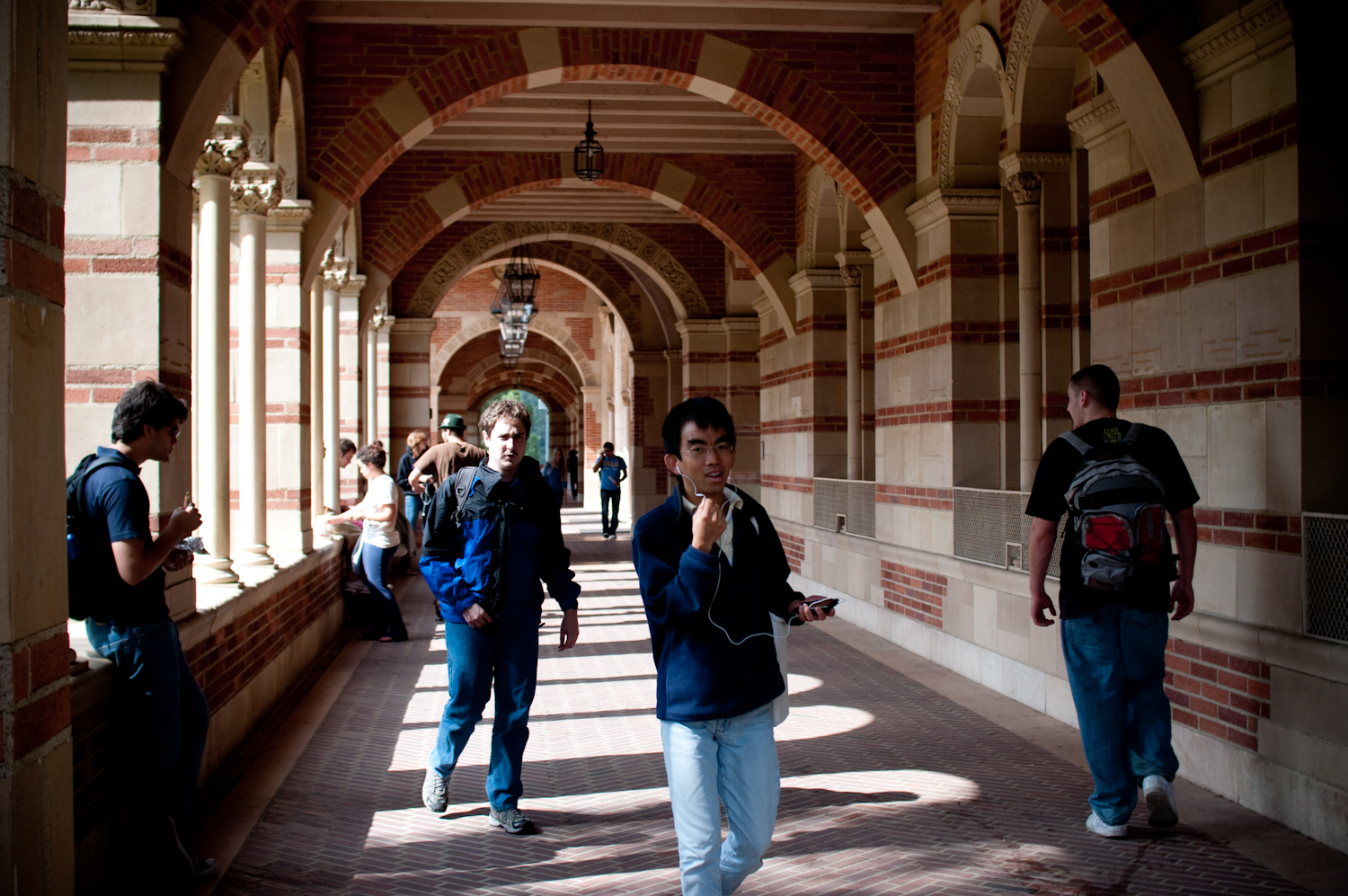Submission: Arthur Wang’s generalizations of Chinese nationals promote prejudice

A variety of students walking outside Royce Hall. (Creative Commons photo by SnippyHolloW via Flickr)
By Daily Bruin Staff
Sept. 18, 2015 9:46 p.m.
Overgeneralization threatens our campus. Misunderstanding and prejudice based on bold speculation from within the student body have been harming our campus climate for years. Allowing Arthur Wang’s words to be taken at face value without input from the other side only exacerbates such problems.
In his article “Chinese nationals and Americans do not share views on Asian supremacy,” Arthur Wang offered some interesting commentary on a piece discussing Ivy League schools’ admission policies by Tianpu Zhang, a Chinese international student at an American law school. Wang calls Zhang out for commenting on domestic politics and questions Zhang’s intention in doing so, and argues that Chinese nationals abroad are “instilled with a strong sense of national pride, cultural righteousness and knowledge” and “are asserting themselves as small pieces in the country’s modern rise to power.” Wang thereby infers that these Chinese nationals abroad are products of their government’s “patriotic education campaign” and advocate a notion of Chinese supremacy, which some scholars perceived as “Chinese exceptionalism.”
At first glance, Wang’s article doesn’t concern our UCLA community directly. However, its appearance in the Daily Bruin worries me. What he meant by, “Why would a Chinese national write about a domestic policy issue? I don’t write about Chinese policy issues while explicitly invoking my American identity,” is questionable. To me, this condescending, none-of-your-business tone is delivering to Chinese international students like me an unfriendly and threatening message by implying that simply because of our nationality, we as Chinese citizens have no legitimacy in discussing the issues that concern American citizens. The title of his article, which juxtaposes Chinese nationals against Chinese Americans, reeks of xenophobia that originates from the oversimplified and antiquated “bad versus good,” “us against them” Cold War ideology.
Let’s take a look at what Wang referenced in his article and see if he delivered the findings of these works accurately. In Ruoxi Du’s paper on the “patriotic education campaign,” the author concludes that “despite that the Chinese leadership has been promoting state-led nationalism emphasizing the uniqueness and legitimacy of China’s current political system … (the) Chinese public’s general evaluation of China … has lowered over the two generations discussed in this paper,” which provides no evidence to support “Chinese supremacy” or “Chinese exceptionalism.” In fact, it ironically suggests the opposite. Simply throwing out academic jargon, selectively quoting studies contrary to their findings and arbitrarily misinterpreting them will not convince well-educated, intelligent readers. However, such provocatively speculative misinterpretation might as well mislead and confuse those who are unfamiliar with legitimate academic inquiry on the topic.
By assuming that all Chinese and even Asian international students’ goal on this campus is to extend their nationalist and even political beliefs, Wang is making a dangerously overgeneralized assertion.
International students comprise 12.6 percent of UCLA’s undergraduate enrollment, and Chinese international students represent a large portion of it. I worry that the distinction Wang overtly intended to draw between Chinese nationals and Asian Americans based on generalizations might possibly facilitate anti-Chinese sentiments against international students on our campus. I’d like to give him the benefit of the doubt that he might not have thought of this when he first wrote his article, but anything that is published on a public venue could trigger an unintended outcome.
Chinese international students are not the only targets of stereotyping, and Wang’s articles suggest that he is well aware of this fact. Only four years ago, Alexandra Wallace, then a UCLA student, filmed the notorious rant, “Asians in the Library.” I am extremely unwilling to bring this incident up, and I won’t describe or comment on such disgrace again.
However, prejudice does exist, and so do stereotypes, ignorance, misunderstandings, distrust and even hatred.
Just like many Americans, many Chinese nationals are apathetic towards politics. In contemporary Chinese society, plenty of Chinese nationals, especially younger generations and those abroad, are skeptical and critical of what they have been told growing up. Many Chinese students choose to come to the U.S. for their higher education precisely because they want to view things from different perspectives. Like many of my peers in this campus, I, an international student from China, learned to think critically and investigate deeper than what things appear to be during my time at UCLA.
The takeaway here is that we, as members of the UCLA community, should stay open-minded and embrace our diversity. Do not judge people based on their backgrounds. May we not dwell too much on distinctions that can foster animosity between Chinese nationals and Chinese Americans, or even non-Americans and Americans. Let’s keep in mind that every one of us is a member of this community we love, and let’s learn to talk to each other as individual human beings.
Chen is a fourth-year statistics student.

